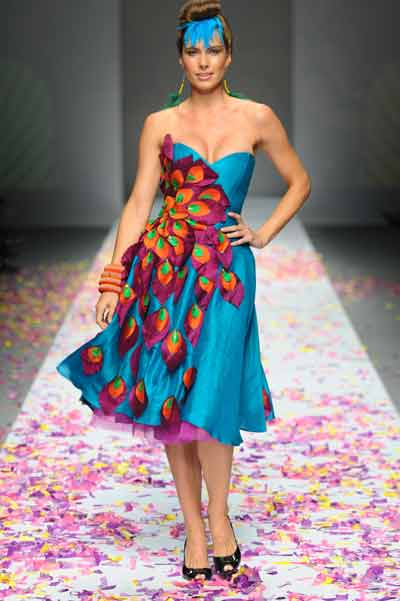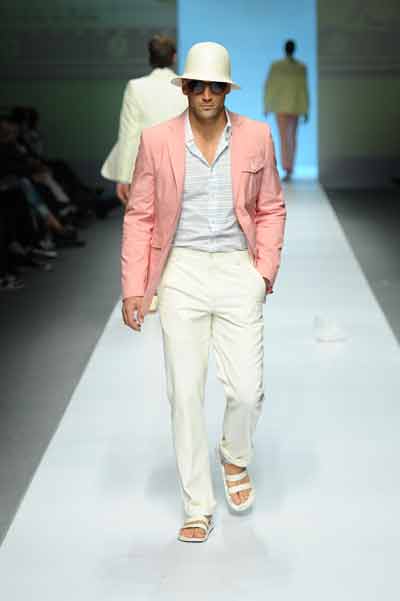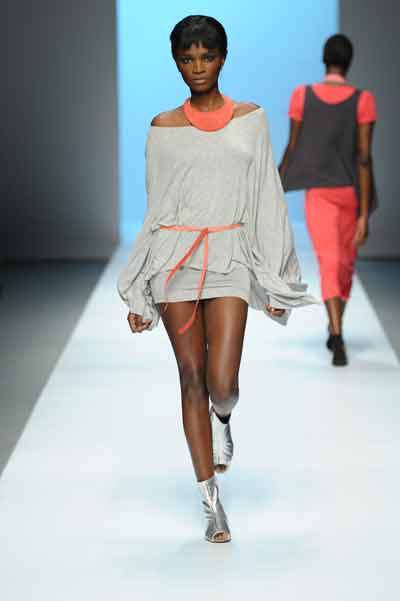South African fashion label Coppelia isn’t trendy and its designer Kirsty Bannerman doesn’t want it to be. She’d rather it remain as relevant today as it was last season.
Showing at African Fashion International’s (AFI) Cape Town Fashion Week on August 12, Bannerman presented designs my grandmother may have possibly worn in her youth.
Yet the floral dresses, elasticized skirts and floral print summer pinafore dresses showcased in her 2010/11 spring/summer collection at the Cape Town International Convention Centre were surprisingly current.

Coppelia: Stays away from trends. (Photo:Simon Deiner/SDR Photography for African Fashion Week)
The Cape Town based fashion designer is unaffected by trends.
This she believes goes a long way when creating a timeless garment. Just as long as you’re “not allowing the passing trends to rule the design,” she told the Mail & Guardian.
A tale of two designers
Indeed, two kinds of designers emerged from the 32 collections shown during the three day fashion event: those that followed the trends and those that set the trends.
Suspender straps, long thin leather belts, layered girly dresses and formal shorts were du jour in most collections.
But the real trendsetter were designers like Nkhensani Nkosi from fashion label Stoned Cherrie, Craig Native from Native Clothing, Doreen Southwood and Viyella. Here’s our round-up of what they flaunted at this year’s show.
Stoned Cherrie

Stoned Cherrie: The colourful peacock dress. (Photo:Simon Deiner/SDR Photography for African Fashion Week)
After canceling her show at Africa Fashion Week in Johannesburg during the Soccer World Cup, Stoned Cherrie’s Love Movement collection was finally shown in the Mother City to enthusiastic applause.
Inspired by “global icons and peace lovers the world over” the collection was a blend of bright colours, beads and sexy designs.
The collection — which, like all Stoned Cherrie designs will be available from women’s clothing retailer Foschini — includes African meets Western influences accentuated by chunky beadwork detailing.
There were showstoppers aplenty, including the sea blue, purple, green and orange peacock dress, a purple Shangaan skirt and the burnt orange flowing short sleeved dress with beads around the neckline.
Viyella

Viyella: Feminine colours produce a masculine look. (Photo:Simon Deiner/SDR Photography for African Fashion Week)
Male fashion label Viyella took fashion audiences on a journey around the continent, travelling through Zanzibar to Cairo using light and dark colours interchangeably while still keeping Viyella’s masculine look.
Although the male models wore pinks, sea greens and egg yellows, the collection remained firmly masculine and sophisticated.
Non-matching suit pants and jackets worn with light shirts and structured sun hats completed the collections spring/summer interpretations.
Michelle Ludek

Michelle Ludek: Simple, light and refreshing style. (Photo:Simon Deiner/SDR Photography for African Fashion Week)
Michelle Ludek returned to Cape Town after a successful five-year career at a large Canadian retailer where she worked as a senior designer. But while her time abroad was spent creating ranges for male and female youth aged 18-23 years, she has set up a local ready-to-wear collection created by women for women.
Ludek’s inspiration comes from her love of nature and the “effortless flair of Europeans with their irreverent cool take on fashion”.
Her simple cuts, light refreshing colours and contemporary sense of style kept with fashion week’s “Refresh, Revive, Renew” theme.
Fashion as business
According to AFI’s Executive Chairperson Precious Moloi-Motsepe, fashion weeks like the one in Cape Town give fashion designers a chance to “get out what they put in”.
Like fashion label Tart which first showcased as an emerging label with AFI.
“Since then the label has achieved commercial success which clearly points out that fashion is not just about being creative but is also a business,” Motsepe told the M&G.
She believes it’s all about changing mindsets of South Africans about local fashion designers “who really need to be promoted to the right platforms”.